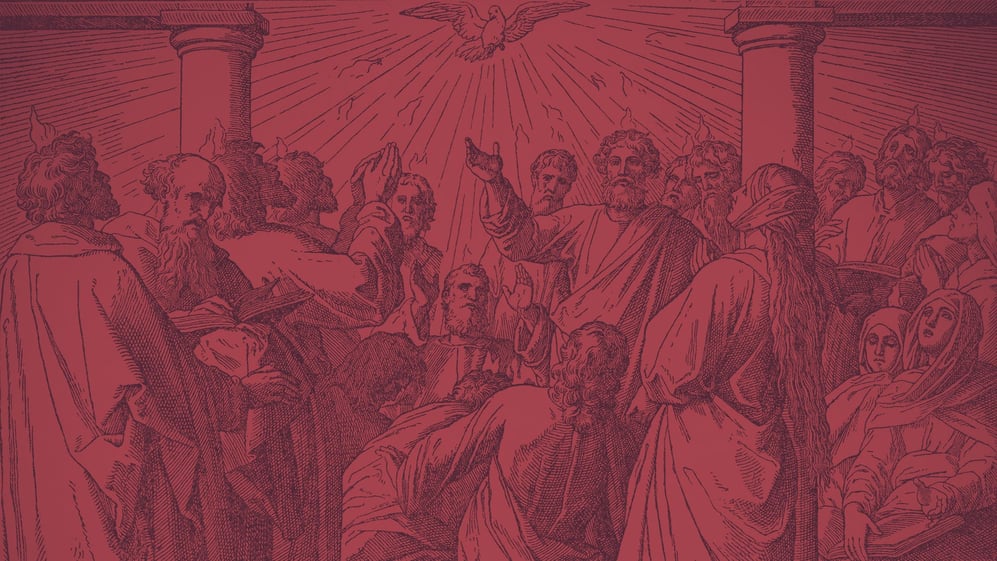As Pentecost approaches, take a few minutes to read Acts 2:1–21, the story of the Holy Spirit descending on the disciples. This passage is the fulfillment of an Old Testament promise and is in response to Jesus’ saving work on the cross.
Scripture Interprets Scripture
Numbers play an important role in this passage. The Feast of Weeks, another name for Pentecost, took place on the first day after seven full weeks following the Passover Sabbath. The Year of Jubilee, which was consecrated to the Lord every fifty years, involved kindness to the poor and the redemption of debts and slaves. Tying these elements together, Pentecost represents the coming of the promised Holy Spirit at the proper time upon the completion of the jubilee redemption of Jesus Christ.
In John 16:7–15, Jesus explains that the Holy Spirit cannot come until Christ completes His work of redemption. The number 7 conveys completeness and totality in Holy Scripture, especially when multiplied by itself. God completed creation in seven days. Jesus rose on the eighth day: His work of redemption and a new creation was finished. The Holy Spirit comes to the disciples as a matter of course. Jesus’ work is complete. His Holy Spirit now comes to equip the saints for the Great Commission.
How is fifty days the right time? Leviticus 24:8–10 outlines how after seven cycles of seven years (49 years), the Israelites are to take an extra year of rest and celebrate Jubilee. Our Lord connects the mercy and redemption associated with the Year of Jubilee to the Holy Spirit’s work of salvation in the Gospel of Jesus Christ. Debts are paid; slaves are bought back every fifty years. Fifty days from Jesus’ resurrection, the Holy Spirit prepares the disciples to share how the Paschal Lamb paid sin’s ghastly debt.
Digging Out the Gems
In Acts 2:4, we learn that the Holy Spirit enabled the disciples present to speak in “other tongues.” The Greek word for “other,” ἑτέραις, is related to the English prefix heter- (as in the words heterosexual and heterodox), meaning “other” or “different.” Because some Christian denominations understand speaking in tongues as the ability to speak in languages indiscernible by anyone but the speaker or another Christian gifted with discernment, it is important that we understand this distinction. The disciples could speak other languages, but the “other tongues” they spoke at this time were meant for the visitors in the vicinity.
In Acts 2:6, the God-fearing Jews who witnessed this sudden change were “bewildered” or “confounded.” The Greek word συνεχύθη, in its root form, could be literally translated as “poured together” or “poured inward.” This is important as we encounter a similar word in verse 17, where the Lord promises to "pour out" (ἐκχεῶ) His Holy Spirit. So, as the Jews turned inward to fear and confusion, the Lord pours out faith, truth, and peace in Christ.
Law and Gospel
We can consider the Law and Gospel present here in relation to unbelievers and Christians. Connect contemporary unbelievers with the Jews present as described above. Present-day unbelievers need to understand that the coming of the Holy Spirit means the end is coming. The Jews at Pentecost likely understood the reference to Joel 2:28–32. Likewise, today, this is a clear warning of the coming destruction.
While there were Jews living in the provinces listed in this passage, these areas also included Gentiles. If the Jews present that day in Jerusalem connected the gift of speaking other tongues with sharing the Gospel, they likely scoffed at the idea of speaking it to Gentiles. In a similar fashion, Christians today may struggle with the idea of sharing the Gospel with certain groups. Should illegal immigrants, Muslims, and convicted felons hear about Jesus? Also, the Holy Spirit enabled the disciples to speak other tongues. Too often today, Christians delegate sharing the Gospel to overseas missionaries or church workers. The issue of nearness is a great encouragement for God’s children to share Christ only with friends, family, and colleagues.
Because Acts 2 presents a clear example of the Holy Spirit working, there is a salient opportunity to teach about decision theology. But Ephesians 2:8–9 makes it clear that faith is a gift from God; unbelievers cannot choose Christ any more than the disciples could enable themselves to speak in tongues.
Regarding the Gospel, consider these thoughts:
1. The coming of the Holy Spirit is evidence of the completeness of Christ’s work (John 16:7). The resurrection was ample proof; His ascension and now, Pentecost, demonstrate that Jesus has satisfied God’s righteous expectations.
2. Stress the purpose of the Holy Spirit working in tongues. God wants the world to know His Son and to have the gifts for which Jesus paid so dearly. Notice also that God plays no favorites; He chooses Jews and Gentiles from every tribe, race, and language.
3. Connect the passage from Joel to the cross. Yes, Jesus will judge the living and dead. Yet in Christ, we will suffer no harm and will be judged righteous.
Preaching and Teaching
Consider this outline for preaching or teaching:
Central Thought: Sinners underestimate the need for Christ and neglect the Lord’s mission. Pentecost demonstrates the finality of Christ’s work and our peace at His return.
I. Sinners underestimate the need for Christ and neglect the Lord’s mission.
A. Sinners underestimate the need for Christ.
1. The disciples could speak in other languages. What was the message?
2. Christ will not return with joy for everyone.
B. Sinners neglect the Lord’s mission.
1. Do some deserve to hear the Gospel more than others?
2. Should I speak in the “tongues” of my family, friends, and colleagues?
II. Pentecost demonstrates the finality of Christ’s work and our peace at His return.
A. Pentecost demonstrates the finality of Christ’s work.
1. The resurrection, ascension, and Pentecost demonstrate the same blessed truth.
2. Jesus loves all the people of the world.
B. We anticipate Christ’s return with peace.
1. I am judged righteous for Christ’s sake.
2. For this reason, I anticipate His return in joy and peace.
To read more on Acts, use the free Books of the Bible Study Questions.














